

Is Your Company AI Ready? Here’s How to Find Out






AI is now being used by many types of businesses, not just tech companies. It helps teams work faster, reduce manual effort, and make more informed decisions. In industries such as aerospace and manufacturing, AI can enhance cost estimates and accurately predict maintenance needs. In the public sector, it supports better program management and improves the delivery of services.
But using AI successfully takes more than just interest or budget. Many companies jump in without knowing if they're ready. They may not have the correct data, systems, or skilled personnel to support AI, which can lead to slow progress, unclear results, or projects that never fully launch.
That’s why an AI readiness assessment is such an important place to start. It gives you the clarity you need before investing time and resources. Studies show that companies that take this step are 47% more likely to see real success with AI. Still, 37% of business leaders skip it, often underestimating its value.
In this blog, we’ll walk you through what an AI Readiness Audit is, why it matters, how Maruti Techlabs approaches it in 3 phases, the key benefits, steps to evaluate readiness, and how to run the audit smoothly.
An AI Readiness Audit is a method for assessing how well-prepared your organization is to utilize AI effectively. It assesses your current position and identifies the necessary steps to move forward. The audit doesn't just focus on tools or technology; it takes a broader view, checking whether your data is reliable, whether your systems can support AI, and whether your team has the right skills.
It provides a clear picture of how well-prepared your business is for AI, showing what's already working, what's missing, and what needs improvement. This makes it easier to plan your next steps rather than guessing or rushing in. You get to see where you are now and what needs to be done to start using AI effectively. The aim is to help you move forward with confidence and avoid mistakes along the way.
An AI Readiness assessment also helps you avoid costly mistakes, like jumping in too early or expecting quick results without proper planning. It provides a realistic view of your strengths and gaps, helping you make more informed choices about AI.
In short, an AI Readiness Audit is about building a strong foundation for AI so your efforts lead to real value, not roadblocks.
AI can help your business work smarter by improving cost estimates, speeding up decision-making, and optimizing resource utilization. But to get these results, your organization must be prepared. That's where an AI readiness assessment plays an important role. It helps you understand your current state and what needs to be addressed before you start with AI.
Many businesses face hidden challenges that can slow down or even block AI adoption:
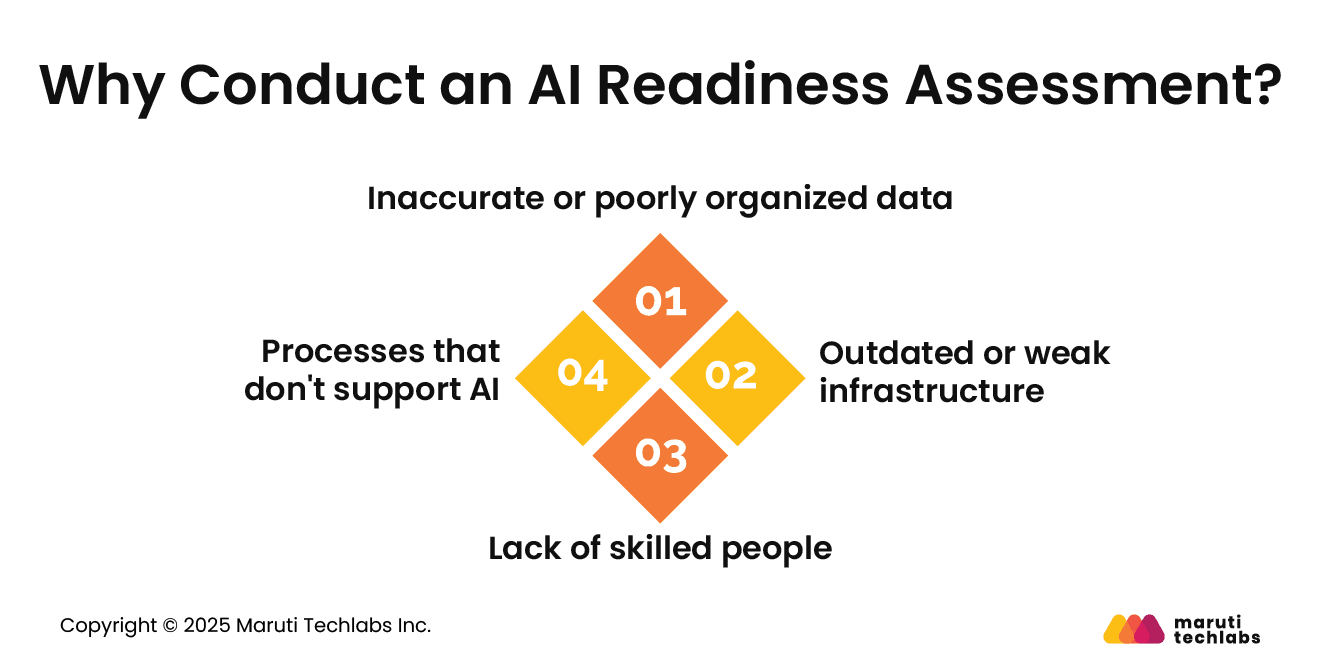
If your data is outdated, incomplete, or stored in multiple locations, AI systems will struggle to deliver accurate results. Reliable data is the foundation of any AI project.
AI requires a robust technical infrastructure, comprising servers, storage, tools, and networks. Without this, even the best AI models won't perform well.
AI tools are only as good as the people using them. If your team lacks the necessary knowledge or training, it can lead to delays and unsuccessful efforts.
Even with the right tools and data, poorly structured processes can hinder progress. AI needs to integrate seamlessly into your organization's existing workflow.
An AI readiness assessment brings all these areas into focus. It helps you prepare every aspect of your organization, including data, systems, personnel, and workflows, so that everything works together for a successful AI journey.
At Maruti Techlabs, we start by getting to know your business, your data, and the problems you’re trying to solve with AI. To make sure you’re truly ready, we follow a simple three-step approach.
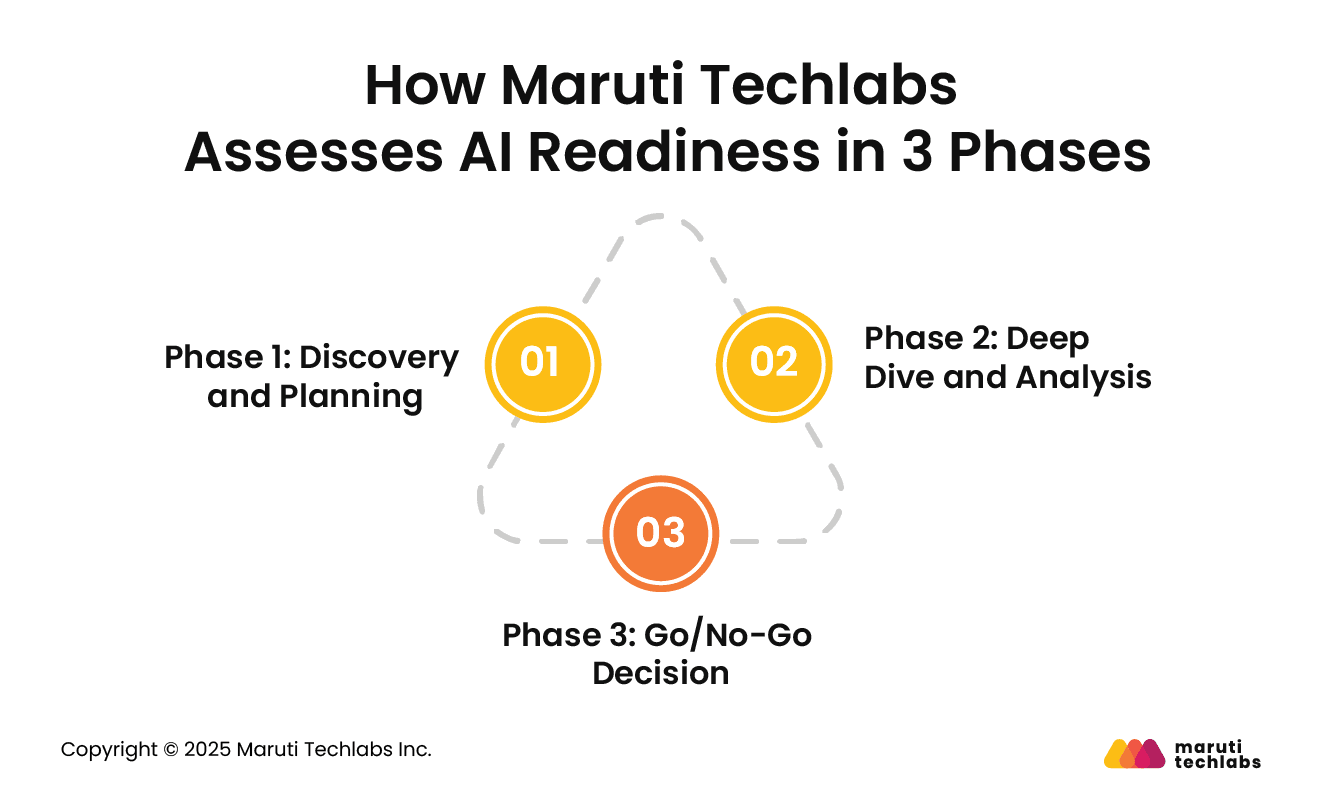
In the first step, we aim to understand your business's current standing. We begin with a meeting to learn about your goals, challenges, and how you currently utilize data.
Then, we assess the quality and usability of your data. We also sit down with your team to discuss where AI could be beneficial. This helps us identify areas where AI can truly add value, not just for the sake of using it.
After identifying a few possible AI ideas, we look at each one in detail. We conduct workshops to determine what is technically feasible. In some cases, we build small test versions to see how the idea might work.
We also look at the business side: how much time or money each use case could save, and what impact it might have. Based on all this, we help you choose the idea that makes the most sense and outline what the project could look like.
We also estimate the business impact of each use case, considering potential savings, return on investment, and other benefits. Based on this, we define the most promising project with clear goals, timelines, and any expected challenges.
In this final phase, we bring everything together and help you make an informed decision. We share a detailed feasibility report that highlights key findings, recommended use cases, risks, and guides how to manage them.
With all this in place, you’ll be able to decide whether to move forward with AI development. If it’s a “Go,” we help you set up a clear roadmap with well-defined deliverables, so you're ready to start building with confidence.
Running an AI readiness audit does more than just prepare your business for AI; it helps you build a strong foundation for long-term success. Here’s how it adds value across different areas of your organization:
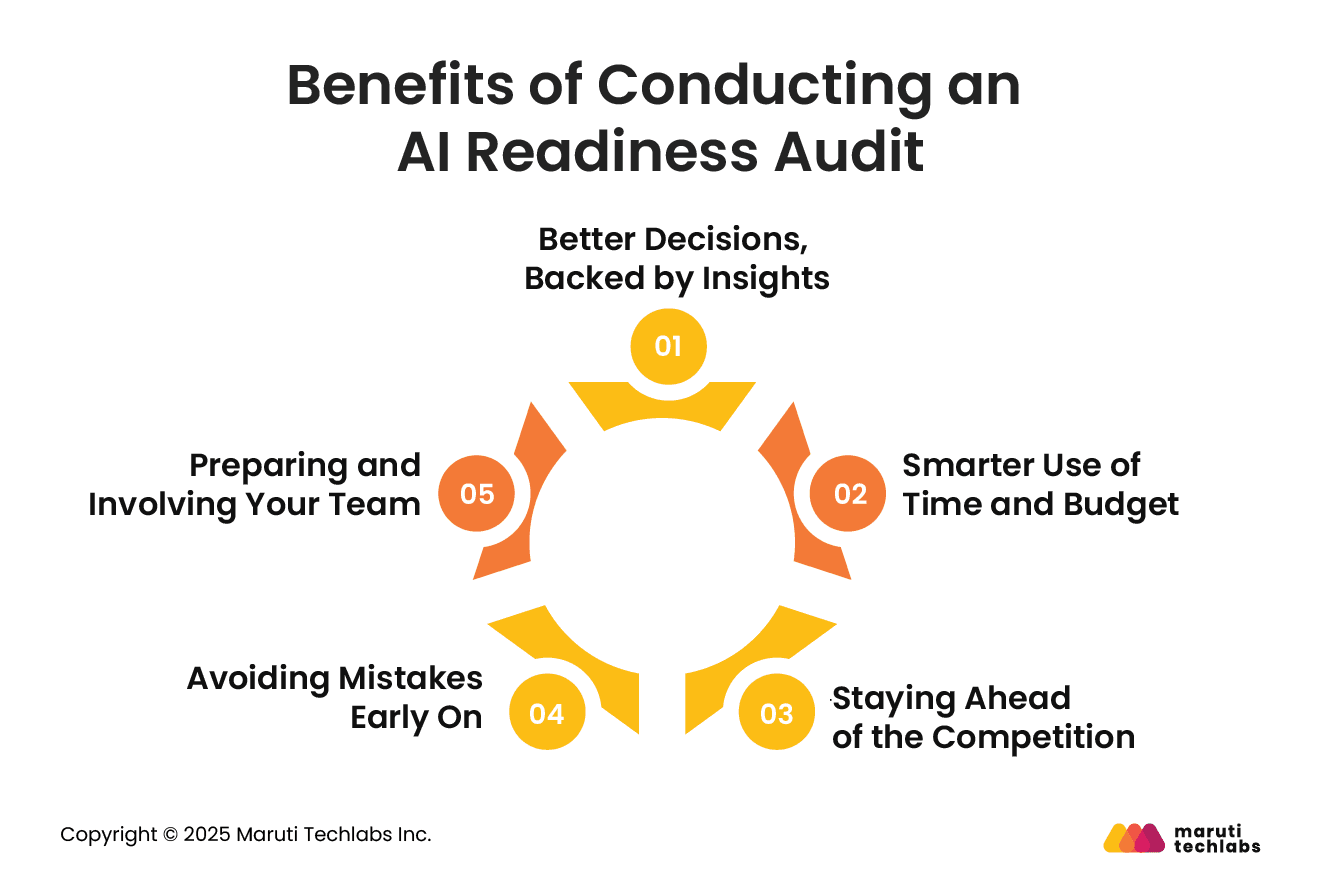
An AI readiness audit helps you understand how prepared your business is for using AI. It shows what’s going well and what needs work. This makes it easier for your team to make informed decisions about using AI, based on real data rather than speculation.
When you know your strengths and weaknesses, it’s easier to use your resources wisely. The audit highlights areas that require the most attention, ensuring your time, money, and efforts are directed where they are most needed. This means better returns on your AI investments and less wasted effort.
Businesses that are ready for AI can move more quickly, enhance their services, and adapt to change more easily. Whether it’s improving customer experiences, streamlining operations, or exploring new ideas, being AI-ready helps you stay ahead in the market.
AI projects can be complex, and mistakes can be costly. A readiness audit helps you spot risks before they become problems. By addressing these risks early, you can avoid delays, budget overruns, or failed initiatives down the line.
Bringing your team into the AI readiness process helps them feel involved and valued. It also provides an opportunity to identify skill gaps and deliver the necessary training. When your employees are prepared and supported, they’re more likely to adopt new tools and work effectively with AI.
Before adopting AI, it’s essential to assess your organization's readiness. A readiness check helps you know if you're fully prepared to start. Here are seven practical steps to evaluate your AI readiness:
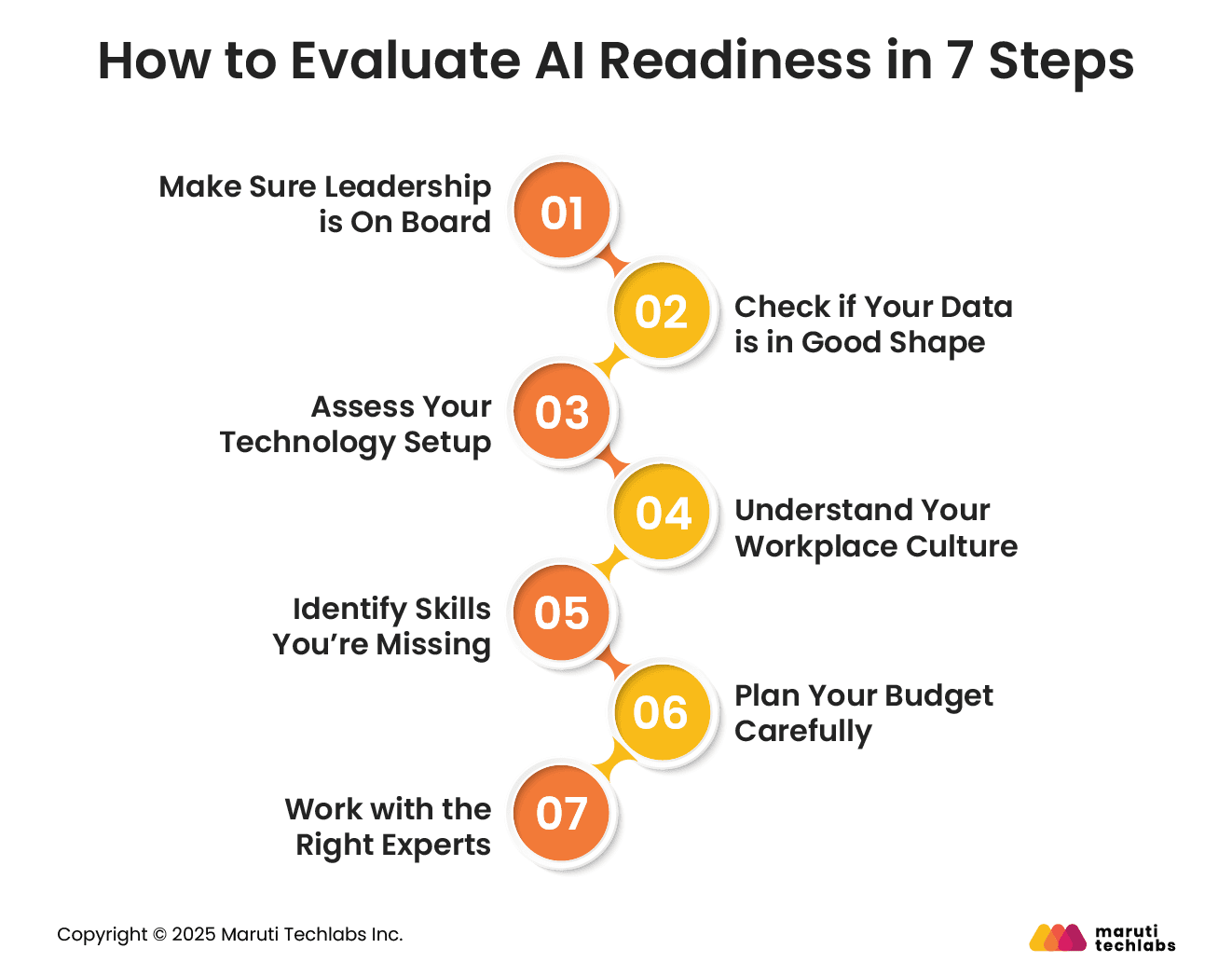
Before starting any AI project, it’s essential to check if your company’s leaders truly support it. This means more than just saying yes; they should understand why AI matters, how it can help the business, and what kind of time, money, and effort it will need.
Have open conversations with your leadership team. Are they ready to support AI plans and provide it with the necessary resources? If the support is not strong, the project might slow down or stop halfway.
AI delivers results only as good as the data it’s built on. Clean, complete, and accessible data fuels high-performing AI systems. But when data is outdated, inconsistent, or siloed across teams, it becomes a roadblock.
Start by auditing the data you already have. Is it standardized across departments? Is it easily accessible when needed? Addressing these gaps early ensures your AI initiatives are built on a solid foundation.
AI tools often need robust systems to run smoothly. Legacy software, slow internet, or limited storage can all hinder progress. Check if your current setup can handle large amounts of data and work with modern AI tools.
Look at your storage, processing speed, and flexibility of your systems. You might need to upgrade or move to cloud-based tools that are easier to scale.
A successful AI project also depends on how open your team is to change. If your employees are curious, willing to learn, and not afraid to try new things, the transition will go more smoothly.
Talk to your teams. Are they excited about new technology, or unsure and resistant? Helping them understand the benefits of AI and involving them early can enhance their acceptance and reduce their fear.
AI can’t do everything on its own. You need people who understand how to work with it. Examine your team and determine if they possess the necessary skills to utilize data or basic AI tools.
If not, you can start by training your current team or by bringing in someone new with relevant experience. Keep the training simple at first, just enough to show how AI can help with everyday tasks. Since AI is constantly evolving, it’s also a good idea to continue learning along the way.
Bringing in AI involves more than just buying software. You’ll need to consider training, infrastructure upgrades, expert assistance, and ongoing maintenance. Without a proper budget, it’s easy to overspend or face delays.
Create a clear plan that covers all expected costs, both in the short term and long term. If you’re not ready to commit fully, consider starting with a smaller pilot project and expanding it later.
If AI is new to your team, collaborating with outside experts can be highly beneficial. Consultants or AI solution providers bring in real-world experience and can guide you through the process.
Select partners who understand your industry and can clearly explain complex concepts in simple terms. They should also be flexible, whether you need help once or ongoing support. Good partners help you avoid common mistakes and move faster with more confidence.
An AI readiness audit helps you understand how prepared your business is to adopt AI. At Maruti Techlabs, we’ve built a free AI Readiness Calculator to guide you through this process step by step. The tool gives you a personalized score based on five key areas.
It helps you understand your strengths, identify gaps, and establish a solid foundation for successful AI use. Here’s how the process works:
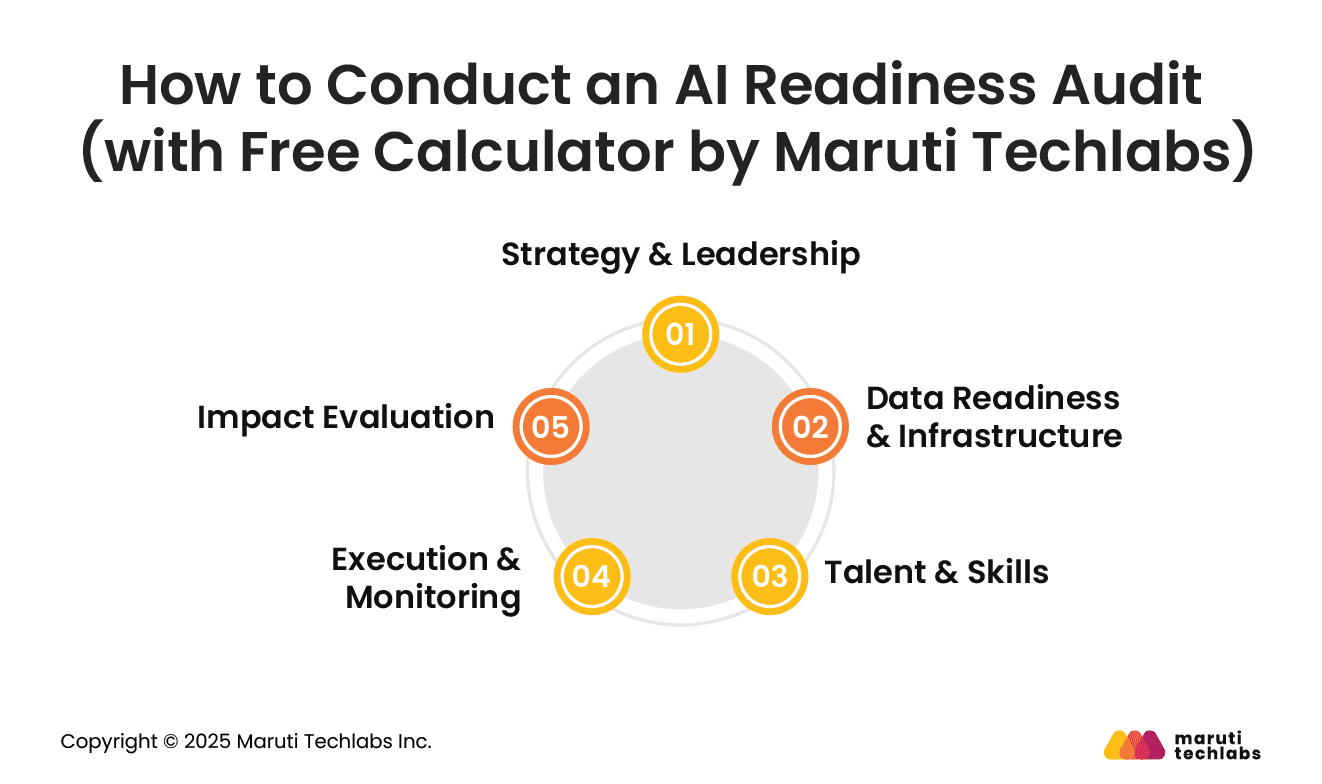
We begin by verifying whether your leadership team supports AI and whether there’s a clear vision for how AI aligns with your overall goals.
Next, we examine the quality of your data and the robustness of your technical systems. AI requires the right data and tools to function properly.
We review your team’s current skill sets to see if they’re ready to work with AI or if they need training or support.
This part checks how well your team can manage AI projects and track their progress.
Ultimately, we assess how AI can benefit your business and help you achieve your goals.
Explore our AI Readiness Calculator to get started.
Being ready for AI makes a big difference. Without the right plan and setup, AI projects can slow down or fail. That’s why an AI readiness audit is so important. It helps you understand where your business stands and what you need to do next.
At Maruti Techlabs, we help you get started with AI the right way. We assess your current setup, identify areas for improvement, and develop solutions tailored to your goals. We stay with you every step of the way, so you feel confident moving forward.
Want to see how ready your business is? Use our free AI readiness tool to check how prepared your business is and get a clear starting point for your AI journey. Contact us today to discuss how we can accelerate your AI initiatives.
AI readiness refers to the extent to which your business is prepared to adopt and utilize AI effectively. It assesses your data, systems, skills, and goals to determine if you have the proper foundation in place for AI to function effectively and deliver value.
An AI readiness assessment usually covers five key areas: leadership support, data quality, technical infrastructure, team skills, and business strategy. It helps you understand what’s working, what’s missing, and what you need to improve before starting with AI.
An AI readiness assessment is a process that evaluates whether your organization is prepared to utilize AI. It reviews your current setup, identifies gaps, and provides a clear plan to move forward with AI adoption in a smart and practical manner.
AI readiness is important because it helps you avoid common mistakes. Without proper preparation, AI projects can fail or waste time and money. Being ready means having the right people, tools, and data to make AI work effectively for your business.
The G20 AI Toolkit is a guide developed by the G20 to help countries assess their readiness for AI. It examines areas such as policy, data utilization, infrastructure, and skills to support the responsible and successful adoption of AI at a national level.
Data readiness means that your data is clean, complete, organized, and easily accessible. AI tools rely on high-quality data to function effectively. If the data is poor or scattered, AI results can be inaccurate or misleading; therefore, preparing your data is essential.


